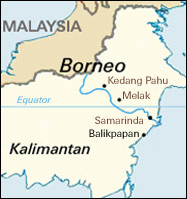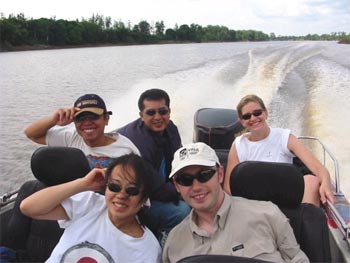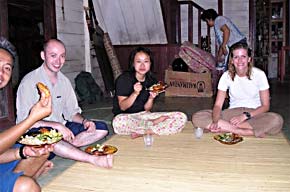  Our hard-working partners Ade (left) and Yoga. (Photo by David Hall) |
Passion for forests; upriver field trip for a first-hand
report
Day 3: Wednesday
Today was an intense day! We met Yoga for breakfast at 7:30 at our hotel. Matilde
really likes noodles and rice for breakfast, while Lindsay can’t get
used to the idea and sticks with American breakfast foods like eggs, toast
and cereal. Directly after breakfast, the team went to work on developing
some background material with Ade that will be used for the business plan.
Ade is very passionate about his work to save the Indonesian forest. This
passion touches every part of his work and is evident in the care he has
already put into the business plan. The team focused on going into detail
on some of the issues we identified in the initial meeting on Day 2.
One of the first tasks we worked on for Ade was an analysis that looked at all the individuals and companies that would be impacted by SEP’s operations and what changes SEP might cause for them. This helped us prioritize who is most important to SEP and what sort of support and incentives they might need to work with us. It also shed some useful light on many of the problems that the new company would face, and how we could overcome some of the critical issues. One of the most important tasks for us to tackle fairly quickly was the identification of potential customers for SEP. We thought about how each potential customer would fit with the company goals and with its rattan products.
Working in such a hot environment creates its own problems, and combined with jet lag, we were all soon feeling the effects of fatigue- induced brain-fade! But we were soon revived by ordering in a spicy lunch.
We have been very lucky not to have had to work in the office of our project
sponsor SHK. Ade managed to secure us the offices of another NGO, Natural
Resources Management (NRM), that came complete with quintessentially British
director Graham, who provided amusing anecdotes and useful insights into
the Samarinda culture and eateries!
 |
After a long day, we ate dinner with Yoga to discuss the plan for the rest of the week. Tomorrow, we are going “upriver,” which is a 2-hour car ride, a 3-hour boat ride, and then another 2-hour car ride into the interior of East Kalimantan. We'll stay there for 3 days, observing rattan harvesting, processing and warehousing, and speaking to local village farmers and traders.
As we plan, Toshi is stressing about what to pack for our trip. We like to scare him with stories of giant cockroaches that live on the jungle floor. Poor Toshi doesn’t realize that they rarely come out of their cool homes under the forest floor to bother humans! In reality, we are all a little worried about malaria, but the disease – and the mosquitoes that carry it – are a way of life in Indonesia, so no one here has much sympathy for our paranoia. We’ll have to put our worries aside and focus on the new experiences we will have in the next few days.
 The team heads upriver in a speedboat, flying past villages and changing scenery. (Photo by Toshi Okubo) |
Day 4: Thursday
 The riverbanks teem with activity: people, boats, docks, even over-water outhouses. (Photo by David Hall) |
The speedboat portion of the trip was great. It was sunny, the roof was off the boat and we flew! It was amazing to see the local villages zip by, and to watch the evolution of the landscape as we entered deeper and deeper into Kalimantan. It was also blindingly obvious the extent of the logging and coal mining activities, given the number and size of the tug-drawn barges carrying the mined natural resources down the river to Samarinda. It’s difficult not to feel sadness at the extent of forest exploitation when you see large swaths of land that used to be forest, now grassland with just a few lame trees left of what was once pristine primary forest.
 Showering, Indonesian style. (Photo by Matilde Kamiya) |
A second short road trip followed to the village of Damai, where we were to be based for the next couple of days. We were staying with one of the local leaders and his family, and they were extremely hospitable. The village itself was connected to the outside world by satellite link, river and mud road. The facilities were basic and we had to get used to a traditional Indonesian bathroom. No shower, just a large oilcan of water and a bucket. No flushing toilet, just a porcelain hole in the floor and a bucket to flush with (and no toilet paper). No sink, just that bucket! It was weird at first, but given the heat, the cool bucket shower was the ideal respite after a long day!
The bedroom was on the top floor of the house with all the mattresses on the floor. There were no glass windows, just openings and shutters. No mosquito nets either, and given Yoga’s comment that one of us was going to get malaria and it would be the one most worried about it, Toshi was worried! Matilde and Lindsay weren’t happy about the lack of air conditioning, while Dave’s tummy took a slight turn for the worse for a day!
 A river taxi skims the flat waters at a more sedate pace. (Photo by David Hall) |
Given the trip, the heat and the excitement, we all slept pretty well and were awakened around 5 a.m. by the call to morning prayer. The plan for the day was to travel further up the river to meet with some of the rattan farmers in a village, so that we could interview them and get to understand some of their problems. This time we took the typical “river taxi,” but given the low level of the river, the ride sometimes involved scraping the hull on submerged logs and river banks!
When we got to the village, we were welcomed by a local rattan trader who was to be our host for the meeting. Some of the local farmers turned up, and we talked about various problems that we would be trying to help them with. The most important thing they wanted us to do was to try and improve the price they got for their rattan. In purchasing terms, 1 kilogram of rattan has depreciated over the past 5 years from being equivalent to 1kg of rice in 1998 to less than 0.25kg today. This has lowered the farmers' standard of living, and while they have other sources of income, improving their rattan opportunities would have a major impact on their day-to-day lives.
 The team meets with a local rattan trader and village farmers. (Photo by David Hall) |
From this field visit, we travelled to another village to meet with a larger trader and discuss her role in the local industry. Here the highlight was Lindsay falling in love with a pet monkey!
The evening was spent back at our home base in Damai, meeting with members of the farmers collective that we are helping set up the rattan trading company for. This was a chance to meet more people whose lives we’re trying to improve, which was another humbling experience. The meeting went on until around 11 p.m., when we all passed out looking forward to a final day in the field.
 Dave, Matilde and Lindsay enjoy dinner with our hosts in Damai. (Photo by Toshi Okubo) |


